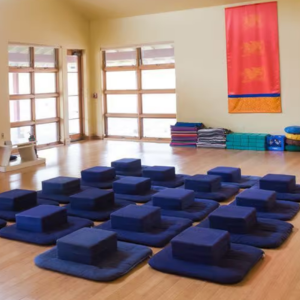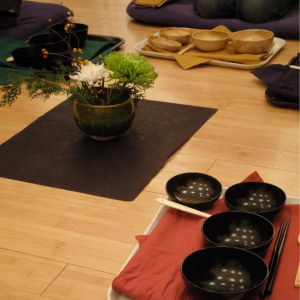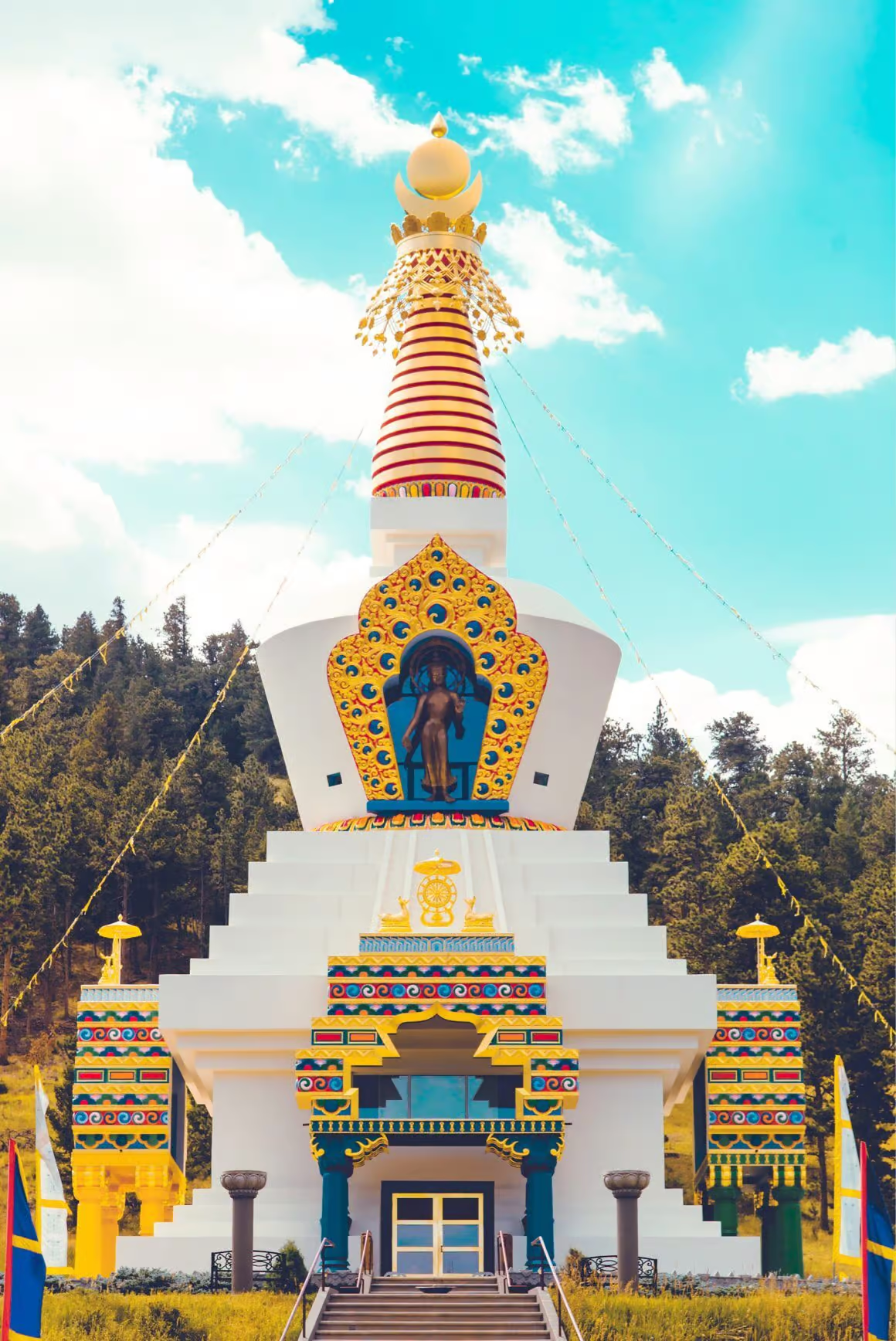Friday
Community ArticlesTender Confidence
A Personal Account of My Weekthun Retreat at Drala Mountain Center
by Eric Bergstrom
Confess your hidden faults.
Approach What you find repulsive.
Help those you think you cannot help.
Anything you are attached to, let it go.
Go to places that scare you.
–Machik Labdron
I was headed to Drala Mountain center in Colorado for an upcoming weekthun retreat I had registered for back in October. Feeling hesitant and excited as my destination grew closer, I could feel my stomach turning. I was encouraged by my MI to sit for longer periods of time, and that was part of the inspiration behind doing this retreat. I was also just curious to see what would happen–inspired to see what my wild mind might pop up with over the span of a week’s time. Little did I know the impact this trip was going to have on my practice and my life altogether. This is just a little glimpse into one of the experiences I had on this beautiful land.
It was December 3, the second day of my weeklong retreat. We had finished the morning sessions of sitting and walking meditation and were headed to lunch, which meant we had a two-and-a-half-hour break. After eating we could do anything from hiking to napping and even helping with sweeping, doing dishes, cleaning, or any other form of community work. I decided to go back to my room for a short nap, because I was absolutely exhausted from being on the road a few days prior and hadn’t gotten a good night’s sleep. While trying to recharge for the afternoon sitting sessions, my brain just wouldn’t quiet down and soon started spinning into an extreme state of panic and fear. No particular storyline was attached to this feeling—just an overwhelming sense of dread. I tried investigating where this feeling might be coming from as I made my way back to the shrine room for the evening sitting sessions. The intensity of this panic and fear would come back with ferocity at times, and it was becoming more and more difficult to work with. The last sitting session ended around seven-thirty that evening, after which I slowly made my way back to my lodge, wondering how to work with this experience I was having. Once back in my room, I called my family and then tried to settle in for the evening. I quickly realized I was not going to be falling asleep anytime soon. I tossed and turned all night, hoping that I could fall asleep and maybe shake this wretched feeling by morning.
The next morning when I woke, I felt as if I had slept and dreamt in that state of mind. I mustered up the motivation to go to the bathhouse down the hall and shower, got dressed, and finally put my coat and shoes on to make my way to the shrine room for the morning sessions. While putting my shoes on, I realized this feeling wasn’t going anywhere. As a matter of fact, it was growing stronger. At this point it was becoming very real to me that this had to be worked with in some way–I would not be able to stay for the rest of the retreat in this state of mind. I started to investigate the feeling further. Then, as if looking in a mirror, I asked myself, What are you afraid of? I searched my brain for answers but only came up with the word “nothing.” Then again, as if looking into a mirror, I replied to myself as a parent might tenderly talk to a small child, saying, You can’t find anything to fear because there is no threat; there is no danger. I kept repeating this to myself as I walked on: There is no threat; there is no danger. There is no threat; there is no danger.
With each step I took toward the shrine hall, I repeated this newfound mantra. As my left foot touched the ground, I said, There is no threat, then when the right foot hit the ground, I said, There is no danger. I got to the hall and took off my shoes and coat to begin morning sitting sessions. It didn’t take long before the feelings of fear and panic started up again. It wasn’t quite as intense this time around, but I figured I would try my new mantra while on the cushion this time. With each inhale, I said, There is no threat, and then with each exhale, I said, There is no danger. This method was quite helpful for a few sessions of sitting and walking meditation, then like an old friend (or enemy), a familiar storyline rose to the surface. I’m sure most of you are familiar with this internal voice that says, You aren’t good enough. Along with this classic line, I was also hearing my internal dialogue say things like, Why do you think you should be allowed on this retreat? What makes you so special? You are such a loser for not tending to your responsibilities back home. You’re a horrible father and husband for doing this. It went on and on, so I kept repeating my mantra—There is no threat; there is no danger—to combat this internal dialogue. It was to no avail. Soon these negative thoughts were all I could hear, and the practice of mindfulness of the breath was a very distant memory.
At this point, I was kind of freaking out and didn’t know what else to do, so I tried my best to sit with these thoughts and feelings of inadequacy. Then I remembered something that my meditation teacher said to me. He always reminded me to be gentle to myself. So I tried my best to sit with this sense of inadequacy and be gentle and compassionate to myself while doing so. As I sat like this for a while, a sense of confidence and openness arose—a confidence that I could sit with this raw, tender feeling toward myself (something like what Chögyam Trungpa refers to as tender heart of sadness). As I opened up even more to this sense of what I came to call tender confidence, I started to notice that I was trembling a bit, as if almost on the verge of tears. This is when more internal dialogue started happening, only this time it was in response to the negative internal dialogue that had been going on earlier. Then again, as if looking in a mirror to face myself, I said in response to all of those negative thoughts, I’m a good person! I could feel tears starting to well up in my eyes as I truly and fully started to accept this proclamation. It wasn’t as if I was saying, I’m a good person, so I deserve this retreat or something like that. It was more of a sense of overwhelming well-being. A feeling that I belong right here at this spot on this earth at this time. Knowing that life with all of its problems along with old age, sickness and death, was perfect as it was. Nothing needed to be fixed or changed at all. This sense of tender confidence allowed me to sit with the tears that ultimately rolled down my cheeks like a waterfall—no sounds of crying yet, just tears gently spilling out of my eyes and down my cheeks in a room full of about twenty people. Never had I even been open to this kind of experience, and there I was going through it. It felt so amazing to sit with this feeling for a few minutes until I felt a stronger urge to break down and cry a little louder. So I got up and walked to the bathroom outside the shrine hall.
I don’t think I will ever forget that experience and the phrase that came to mind: tender confidence. Tender confidence can allow us to see our own basic goodness and, in turn, see the basic goodness in others as well. It helps us sit with what is and hold it with compassion toward ourselves, no matter what may come up. I still use my mantra whenever I have a feeling without a storyline behind it. It usually proves to be helpful, when I can remember to apply it! Remembering that phrase, along with the basic goodness we all consist of (our fundamental qualities of gentleness, openness, and compassion), has been so beneficial as my path continues to unfold. I’m hoping this will be of benefit to those who are willing to practice investigating their minds with curiosity, humor, compassion, and dedication. May this benefit all sentient beings.
–EB–









